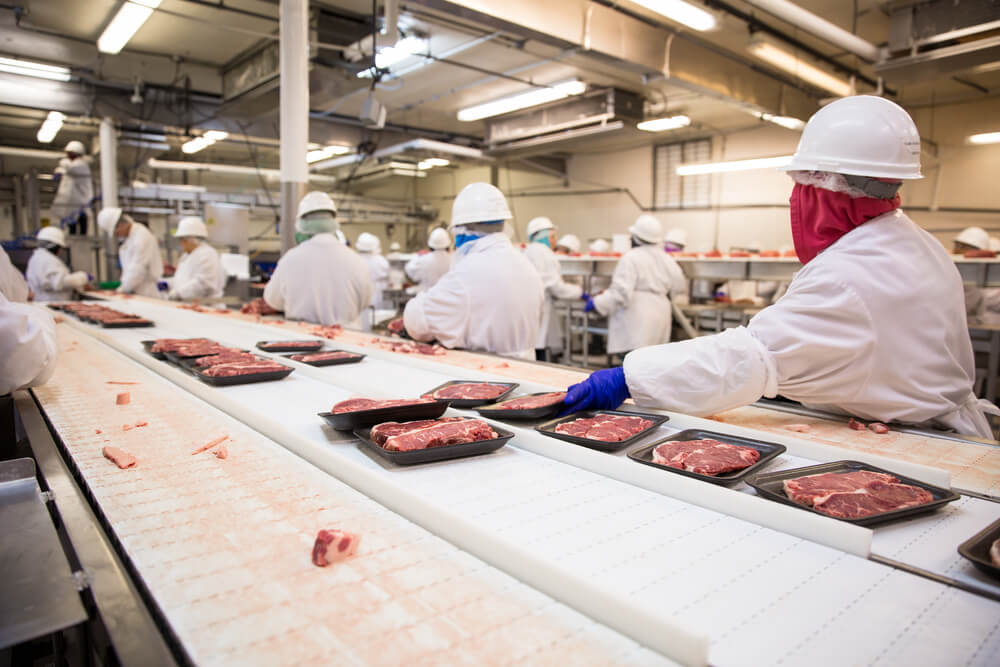ImpactAlpha, March 2 – COVID-19 hit the global meatpacking industry with force and put a spotlight on the industry’s long-standing hazardous labor practices. Coupled with investors’ growing attention to environmental, social and governance (ESG) issues, investors are demanding action to mitigate the risks posed by poor working conditions. They’re calling for more robust workforce protections to strengthen the industry’s resilience – in both the long and short-term – through improved policies, disclosures and practices.
Last January, FAIRR, the $48 trillion-backed investor network engaging the global food sector, launched an investor engagement with seven of the largest global meat companies to address concerns over persistent labor challenges. The companies include BRF (Brazil), Cranswick (U.K.), JBS USA (U.S.), Marfrig (Brazil), Sanderson Farms (U.S.), Tyson Foods (U.S.), and WH Group (China). Engagement findings suggest that if investors are to address labor risk in the industry, the best starting points should focus on elevating worker voice through enforcing and monitoring strong labor policies in three key areas: health and safety, fair working conditions, and worker representation.
Meatpacking’s labor woes
COVID-19 laid bare the material risks of weak corporate policies, which fail to protect the meatpacking industry’s backbone: its workers.
The working conditions of meat processing plants, including low-temperatures, lack of ventilation and shoulder-to-shoulder work environments, put workers at a higher risk of contracting and spreading the virus. These factors, combined with weak labor relations that limited the ability of workers to report or respond to risk of contagion, put meatpacking plants at the centre of numerous outbreaks. High rates of contagion caused worker absenteeism to soar and caused tragic losses for workers and their families.
The subsequent labor shortages in North America and Europe added pressure on remaining workers to maintain production volumes. When economic incentives are aligned to production output rather than safety targets, employees are cornered into risk-taking behaviour (like working while sick), which contributes to the culture of poor health and safety at plant level and exacerbated contagion during the first wave.
The economic incentives of most meat producers are inadequate to prevent risk-taking behaviour. JBS USA is the only company in our engagement that offers a minimum paid-sick-leave allowance across its operating markets. Most companies had to enhance their failing sick-pay policies to counter the usual work-while-sick culture. None of the seven companies surveyed have yet committed to extending enhanced pandemic-related sick leave as a permanent policy across operations. Tyson Foods made an important step last August when agreeing to provide 20 hours paid leave to all workers, but the benefit is limited to those who get vaccinated against COVID-19 in its primary market.
The pandemic also exposed the particular vulnerability of migrant workers, who comprise more than a third of the U.S.’s meatpacking workforce and nearly two thirds in the U.K. The meatpacking industry’s over-reliance on low-cost migrant labor contributes to weak worker protection which can lead to cycles of exploitation. Language barriers, high levels of poverty and uncertain immigration status hinder migrant workers’ ability to negotiate favorable terms and conditions or collectively speak out on the dangers of their jobs.
The sector’s heavy reliance on precarious contracts also exposed meatpacking operations to sudden shifts in labor availability that impacted production. Workers that depend on contract renewal are in a weaker position to negotiate conditions and will resort to leave their post to protect themselves from risk-taking or abusive management at the expense of losing their livelihood.
In the animal protein industry, the average rate of staff on non-permanent contracts across regions is 35%, with the highest rate (87%) reported in North America. The global average is likely to be higher, but protein producers offer low disclosure on this topic. Sanderson Farms is more advanced than its peers in this respect: it reports labor metrics by employment contract for its entire workforce at country level. On the other end of the spectrum is JBS USA, which does not report on contracts at all, despite employing more than 100,000 people, of which about 40% are based abroad.
These companies must recognize the opportunity to modernize worker protection and reporting standards in the global meatpacking industry while mitigating risks to their operations and profits.
Stewardship priorities
As in the meatpacking industry, the pandemic (and climate change) has stirred public scrutiny and underscored the need to rethink the future of corporate relations with employees. What steps can investors take to elevate workers’ voices in their investees’ supply chains, and collectively strengthen working conditions that will provide resilient, green jobs for the long-term?
Investors should urge companies to ensure that there are effective and legitimate reporting mechanisms in place that protect workers from retaliation; to report on the steps taken to enforce and monitor corporate policies on human and labor rights; and to report on efforts to engage workers and their representatives on corporate strategies for automation and climate risk.
Investors themselves will have to improve their own understanding of the risks posed by poor labor management strategies in order to hold companies to account.
While the pandemic has taken a terrible toll on the meat industry, it has also presented an opportunity for the industry to change its worker protection practices. Now more than ever, investors need to work with these companies to drive change, minimize daily dangers for workers on the job, and reduce the impacts of labor risk on companies’ bottom lines.
FAIRR is part of a community helping food industry companies build resilience against environmental and social risks and pursue safe employment for all. Our engagement on working conditions, supported by 50 asset owners, asset managers, debt holders and investor representatives representing more than $11 trillion in combined assets, is open to investors until March 17, 2022.
Cristina Figaredo is a manager of research and engagement of FAIRR’s Working Conditions initiative.











